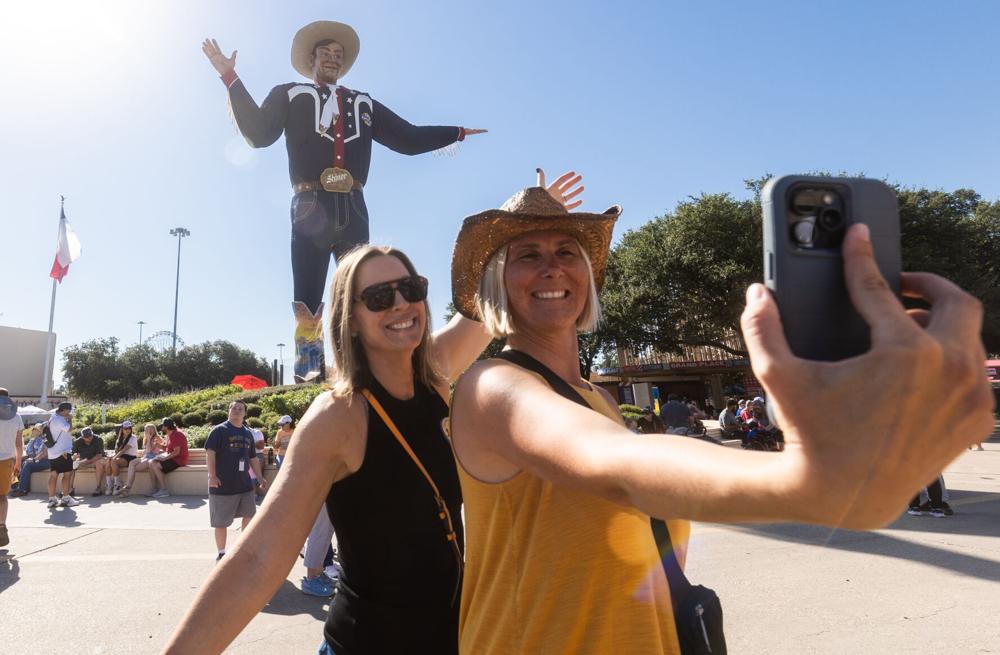 Big Tex, Corny Dogs and Texas Star: The state fair returnsThe 2025 State Fair of Texas is scheduled to open Sept. 26 and run until Oct. 9 at Fair Park in Dallas, featuring 24 days of celebration of Texan food, music, rides and culture. Prices of tickets vary by day, with discounts available online. Taylor Pulfer, State Fair of Texas director of communications, described this annual event as the organization's largest fundraiser, with all proceeds dedicated to the nonprofit mission of supporting education, community giving and the preservation of Fair Park. One of the fair's signatures is its “Texas-sized” twist on traditions. Fairgoers are greeted by Big Tex, a 55-foot cowboy, with his signature “Howdy, folks,” while the Cotton Bowl stadium hosts the Allstate Red River Rivalry football game. Another staple is the Big Tex Choice Awards, a creative fried food competition that has become a tradition that can’t be found anywhere else, Pulfer said in an email. Food remains one of the fair’s central experiences. Alongside classics such as Fletcher’s Corny Dogs, visitors can try this year’s Big Tex Choice award-winning foods, including the Crab and Mozzarella Arancini, Chill and Thrill Delight, Cookie Chaos Milkshake and Wagyu Bacon Cheeseburger Deviled Egg Sliders. Pulfer said this fair is a “tradition that gives back.” It drives tourism, supports small businesses, showcases Texas agriculture and helps fund scholarships and community programs. For first-time visitors, Pulfer recommended starting with a photo with Big Tex, grabbing a corny dog, then exploring Midway rides, the livestock barn, the auto show, cultural exhibits and live music. “The Fair is a tradition that brings people together,” Pulfer said. “For many families, it’s where memories are made year after year.” @samip.parajuli.54 news-editor.shorthorn@uta.edu
Big Tex, Corny Dogs and Texas Star: The state fair returnsThe 2025 State Fair of Texas is scheduled to open Sept. 26 and run until Oct. 9 at Fair Park in Dallas, featuring 24 days of celebration of Texan food, music, rides and culture. Prices of tickets vary by day, with discounts available online. Taylor Pulfer, State Fair of Texas director of communications, described this annual event as the organization's largest fundraiser, with all proceeds dedicated to the nonprofit mission of supporting education, community giving and the preservation of Fair Park. One of the fair's signatures is its “Texas-sized” twist on traditions. Fairgoers are greeted by Big Tex, a 55-foot cowboy, with his signature “Howdy, folks,” while the Cotton Bowl stadium hosts the Allstate Red River Rivalry football game. Another staple is the Big Tex Choice Awards, a creative fried food competition that has become a tradition that can’t be found anywhere else, Pulfer said in an email. Food remains one of the fair’s central experiences. Alongside classics such as Fletcher’s Corny Dogs, visitors can try this year’s Big Tex Choice award-winning foods, including the Crab and Mozzarella Arancini, Chill and Thrill Delight, Cookie Chaos Milkshake and Wagyu Bacon Cheeseburger Deviled Egg Sliders. Pulfer said this fair is a “tradition that gives back.” It drives tourism, supports small businesses, showcases Texas agriculture and helps fund scholarships and community programs. For first-time visitors, Pulfer recommended starting with a photo with Big Tex, grabbing a corny dog, then exploring Midway rides, the livestock barn, the auto show, cultural exhibits and live music. “The Fair is a tradition that brings people together,” Pulfer said. “For many families, it’s where memories are made year after year.” @samip.parajuli.54 news-editor.shorthorn@uta.edu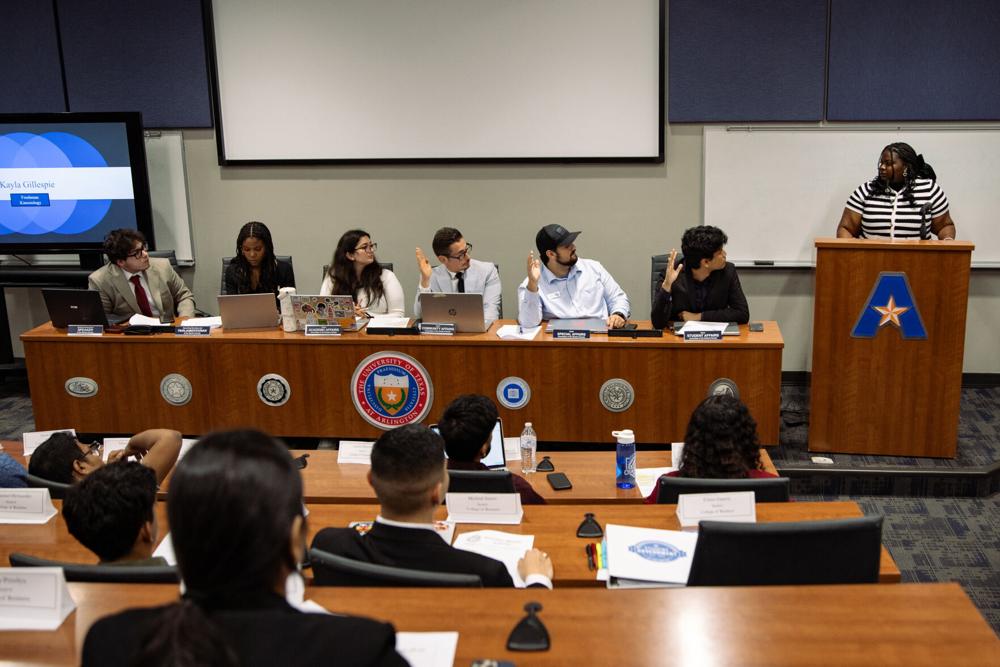 Student Senate swears in Supreme Court justice, introduces four resolutionsStudent Senate members appointed a new Supreme Court justice, introduced four new resolutions and voted on one resolution during their Tuesday meeting. The body confirmed Kayla Gillespie, nominated by Student Body President Effua Jordan, as the fifth Supreme Court justice. Jordan said Gillespie has consistently shown herself to be a leader grounded in service, integrity and community, and has made it clear that she will approach her role with balance and impartiality. Gillespie said she brings the perspective of someone who wants the community to grow. “College is about making memories and building a community when you’re away from home, and I just want to make sure that everyone gets that chance because they deserve it,” she said. During the meeting, student senators passed Resolution 25-13, “Move Out of the Way,” after deliberation. The resolution aims to create designated parking spots for campus delivery and supply trucks that do not interfere with the routes of the MavMovers. Samuel Duncan, College of Liberal Arts senator, raised concerns over student parking, noting it is already limited and that some lots that would be utilized are full. Others said that the delivery drivers would be moving after a set period of time and that the proposed maps are temporary until there is a more fleshed out parking map after renovations are completed. “Parking is already a problem,” said Hephzibah Akinmade, College of Nursing and Health Innovation senator. “But it’s not like we’re taking all this space with the student; they’re just there for a set amount of time, so the order of everyday life is going to move on.” Resolutions 25-18, “Cultivating Campus Civic Culture”; 25-19, “Title IX, Don’t Take Mine”; 25-20, “TextBook Sell-Back Drive”; and 25-21, “Analog Manual,” were introduced to the senate. During the open forum, Andres Morales, Student Body vice president, addressed the senate about the upcoming senatorial reelection, as today was the campaign kickoff. In his speech, Morales said 17 student senators were up for reelection, noting they cannot flow through the election cycle comfortably. He questioned the senators, asking, “What have you done for your constituents? Have you used this responsibility? Have you shown up and voted when it really mattered?” “To be a senator is to carry influence and with it accountability; your votes, your presence and your voice do more than just fill these seats right here,” he said. Resolutions 25-14, “Shh-tudy Rooms,” and 25-15, “Minimum Wage, Maximum Impact,” were killed. Academic Affairs Chair Emman Khan said Resolution 25-14, “Shh-tudy Rooms,” was killed because the library is already working on initiatives that the bill asks for, which is making library study rooms more soundproof. Student Affairs Chair Roberto Sok said Resolution 25-15, “Minimum Wage, Maximum Impact was killed due to the minimum wage being set to $10 by the UT System. Updates on the research process were given on Resolution 25-17, “Gimme My Greens,” and Resolution 25-16, “Condom Convenience.” The next Student Senate meeting will take place at 6 p.m. Sept. 30 in the Student Government Chambers. @tay._.sansom news-editor.shorthorn@uta.edu
Student Senate swears in Supreme Court justice, introduces four resolutionsStudent Senate members appointed a new Supreme Court justice, introduced four new resolutions and voted on one resolution during their Tuesday meeting. The body confirmed Kayla Gillespie, nominated by Student Body President Effua Jordan, as the fifth Supreme Court justice. Jordan said Gillespie has consistently shown herself to be a leader grounded in service, integrity and community, and has made it clear that she will approach her role with balance and impartiality. Gillespie said she brings the perspective of someone who wants the community to grow. “College is about making memories and building a community when you’re away from home, and I just want to make sure that everyone gets that chance because they deserve it,” she said. During the meeting, student senators passed Resolution 25-13, “Move Out of the Way,” after deliberation. The resolution aims to create designated parking spots for campus delivery and supply trucks that do not interfere with the routes of the MavMovers. Samuel Duncan, College of Liberal Arts senator, raised concerns over student parking, noting it is already limited and that some lots that would be utilized are full. Others said that the delivery drivers would be moving after a set period of time and that the proposed maps are temporary until there is a more fleshed out parking map after renovations are completed. “Parking is already a problem,” said Hephzibah Akinmade, College of Nursing and Health Innovation senator. “But it’s not like we’re taking all this space with the student; they’re just there for a set amount of time, so the order of everyday life is going to move on.” Resolutions 25-18, “Cultivating Campus Civic Culture”; 25-19, “Title IX, Don’t Take Mine”; 25-20, “TextBook Sell-Back Drive”; and 25-21, “Analog Manual,” were introduced to the senate. During the open forum, Andres Morales, Student Body vice president, addressed the senate about the upcoming senatorial reelection, as today was the campaign kickoff. In his speech, Morales said 17 student senators were up for reelection, noting they cannot flow through the election cycle comfortably. He questioned the senators, asking, “What have you done for your constituents? Have you used this responsibility? Have you shown up and voted when it really mattered?” “To be a senator is to carry influence and with it accountability; your votes, your presence and your voice do more than just fill these seats right here,” he said. Resolutions 25-14, “Shh-tudy Rooms,” and 25-15, “Minimum Wage, Maximum Impact,” were killed. Academic Affairs Chair Emman Khan said Resolution 25-14, “Shh-tudy Rooms,” was killed because the library is already working on initiatives that the bill asks for, which is making library study rooms more soundproof. Student Affairs Chair Roberto Sok said Resolution 25-15, “Minimum Wage, Maximum Impact was killed due to the minimum wage being set to $10 by the UT System. Updates on the research process were given on Resolution 25-17, “Gimme My Greens,” and Resolution 25-16, “Condom Convenience.” The next Student Senate meeting will take place at 6 p.m. Sept. 30 in the Student Government Chambers. @tay._.sansom news-editor.shorthorn@uta.edu
- Gov. Greg Abbott signs order banning minors from THC productsGov. Greg Abbott recently signed an executive order banning hemp and hemp-derived product consumption for minors and regulating its sale, though critics question its impact. On Sept. 10, Abbott directed the Department of State Health Services and the Texas Alcoholic Beverage Commission to prohibit the sale of hemp-derived products to minors and require age verification upon purchasing for all customers; retailers who violate the order will have their permits revoked. “Safety for kids, freedom for adults,” Abbott said in a post on X. Texas’ growing hemp industry was left largely in the fate of consumers after Abbott vetoed Senate Bill 3 earlier this year. Since the 2018 federal Farm Bill legalized industrial hemp nationwide, Texas has seen rapid expansion in the market. The product remains legal under current interpretations of the federal and state law, as long as they contain no more than 0.3% Delta-9 THC by dry weight. As the executive order does not ban the product itself, some lawmakers, including Lt. Gov. Dan Patrick and state Sen. Charles Perry, remain dissatisfied. In a statement issued Friday, Patrick argued that the order gives the current THC market a seal of approval. “These are the same people who have been selling dangerous THC products to kids and teens for the last four years in thousands of locations across Texas,” he said. “They will continue to do so under this executive order without a ban.” Chase Whitworth, Artisan Vapor and CBD Collins district manager, said the governor’s order represents a fair compromise. “I personally think that it’s a good thing that that’s happening, cutting regulation on the use for minors to be attacked by the THC industry,” Whitworth said. According to a report from Whitney Economics, tetrahydrocannabinolic acid, delta-8 THC, delta-9 THC, delta-10 THC, CBD and cannabigerol are some of the most common hemp-derived products sold in Texas. According to the Centers for Disease Control and Prevention, cannabis affects brain development and functions, specifically the parts of the brain responsible for memory, learning, attention, decision-making, coordination, emotions and reaction time. The center said usage before 18 may affect how the brain builds connections for functions like attention, memory and learning, and the effects could be permanent. Patrick said the legislature never voted to legalize recreational marijuana or the THC products sold now, but due to the loophole in hemp laws, highly potent THC products are being sold, which is why Senate Bill 3 was passed in the Texas House and Senate during the regular session. Since the veto in late June, Abbott put the item on the agenda for two special sessions over the summer. In a proclamation issued June 22, Abbott said SB 3, as written, would create legal uncertainty for Texas farmers, as the bill criminalizes the manufacturing, distribution and sale of all consumable hemp products, regardless of whether they comply with federal law’s THC limits. The governor’s latest order requires the Department of State Health Services and the Texas Alcoholic Beverage Commission to immediately create an age limit, but does not prescribe when the restriction must take effect and calls for both agencies to work with the Department of Public Safety to increase enforcement on existing rules. The Department of State Health Services is also required to begin reviewing the current rules within 10 business days to possibly add stricter labeling and testing, improve recordkeeping to facilitate oversight and increase fees to support enforcement. Sid Miller, Texas Department of Agriculture commissioner, said Abbott deserves praise for protecting minors from THC products while respecting the rights of adults. “Protecting our kids and defending our freedoms do not need to be at odds,” Miller said. Although Whitworth supports increased protections for youth, he said he worries that ongoing debates and potential bans could hurt small businesses. “Lots of these small mom and pop shops won’t survive as well based off of that,” he said. “They won’t be able to recover.” Perry said in a post on X that the age restriction does not fix the problem, and it gives the industry what it wants by leaving the product on shelves and ensuring the legislature will not close the loophole. “This debate isn’t over, and I will not stop fighting until we secure real protections for our communities and prevent Texas from repeating the mistakes of other states,” Perry said. @tay._.sansom news-editor.shorthorn@uta.edu

- Preparedness in the Park to bring weather emergency education to Levitt PavilionPreparedness in the Park will be hosted by UTA’s Office of Emergency Management, the Arlington Fire Department and Levitt Pavilion at 5:30 p.m. Thursday at Levitt Pavilion as part of National Preparedness Month. The event will feature educational booths and a screening of the film “Twisters,” as well as giveaways of National Oceanic and Atmospheric Administration weather radios. One radio will be given away per household through the giveaway, while supplies last. Kwa heri Harris, the director of emergency management at UTA, said the biggest thing attendees can look forward to is the opportunity to learn and gather as a community. “We believe that preparedness saves lives,” Harris said. “It's also better to be proactive in making sure you have a preparedness plan and a preparedness kit, versus being reactive.” Some booths at the event will be dedicated to building a 72-hour emergency kit, making emergency family plans and educating about outdoor warning sirens. Harris said they worked to make sure the event would be an interactive and fun environment where attendees could learn. “We thought that it would be a good idea to bring the community together to talk to them about the importance of having a plan and being equipped,” she said. Parking for the event will be free, with open seating available on the lawn. Attendees can bring lawn chairs and blankets to watch “Twisters” during the screening. @hud4qureshi news-editor.shorthorn@uta.edu
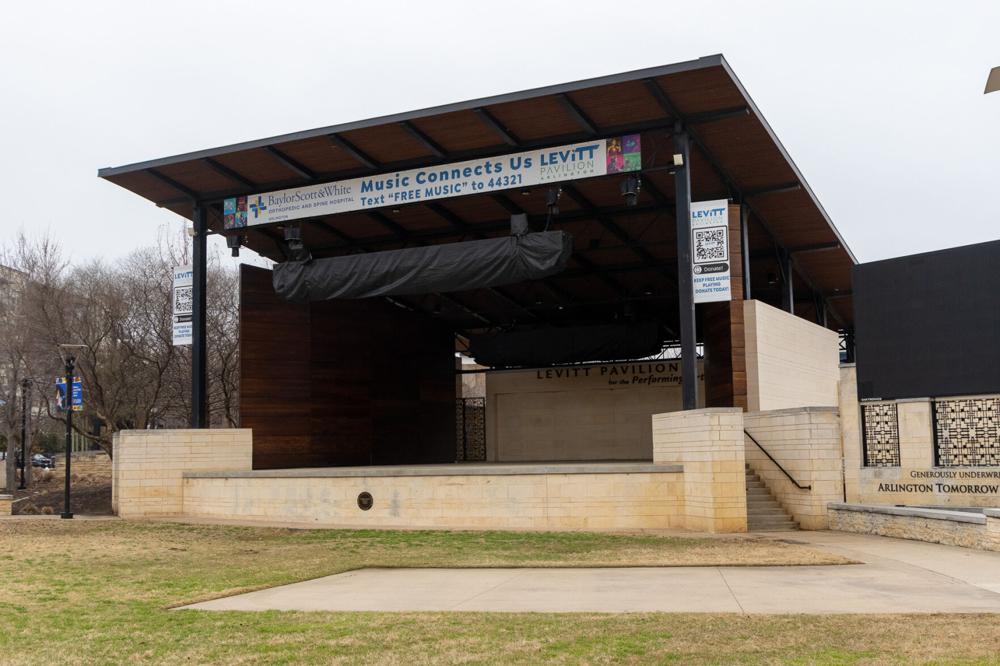
- Graduate School Expo to host UTA colleges and other universities, providing grad resources to studentsThe Office of Admissions is hosting the Graduate School Expo event from 10 a.m. to 1 p.m. Wednesday in the Palo Duro Lounge in the University Center. Representatives from UTA colleges and other universities will be available to share information about their offered graduate programs. Ashley Jackson, lead graduate and international academic recruiter, said the event will provide current students with an opportunity to interact with institutions and learn about master’s and doctoral programs. “The Graduate School Expo is a great place to explore and see what might be a good next step for you after you graduate,” Jackson said. The event will have limited door prizes for the first 100 participants and there will also be UTA-branded cookies at the event. Jackson said individual universities and colleges from UTA will have their own giveaways as well. “This is another great way to network with universities, potential graduate schools and recruiters,” she said. “You never know what doors may be opened, and pathways may unfold that you weren’t even considering.” @wall035203 news-editor.shorthorn@uta.edu

- Meet 6 campus leaders that help the university functionAs of fall 2024, UTA recorded over 41,000 students enrolled on campus. Keeping a university of that scale functioning daily takes a lot of work behind the scenes. The Shorthorn selected six key leaders from across campus to speak about their day-to-day work, beyond their titles. Lowell Davis Davis became the vice president of Student Affairs in 2023. In his role, he is responsible for leading Student Affairs, which focuses on student life and engagement, health and wellness, student success and housing, he said. “Oftentimes, Student Affairs is viewed as the unit to deal with students who are causing problems, and I want to change that narrative,” Davis said. “The Division of Student Affairs is here to support the classroom activities with cocurricular experiences.” Before UTA, Davis served as vice chancellor for Student Affairs at the University of North Carolina Wilmington. He also held positions at The University of Alabama, Indiana University and Hampton University. Having gone to high school in South Dallas, Davis said working at UTA feels personal for him. “I feel like I am helping students who may not be the richest, they may not be the poorest, but they want to get a college education, and they too want to be difference makers,” he said. Effua Jordan Jordan, nursing junior and former Student Body chief of staff, now serves as the Student Body president for the 2025–26 academic year. Jordan primarily acts as the main liaison between Student Government and university administration. She works to implement resolutions, manage the Student Government branches and assist the Student Body vice president with recruitment. She also helps coordinate events such as Cookies with Cowley, where UTA President Jennifer Cowley discusses university matters with students, and the President’s Roundtable, a private forum for student leaders to engage with the administration. Jordan said the work behind the organization is complex but rewarding, pointing to the successful resolution for the new University Center as an example of this effort paying off. “I hope that in the future, we’ll be able to have a solid group of student leaders who are all fighting for the same thing and all working together to uplift each other’s communities,” she said. Jon Fagg Fagg has served as UTA’s Athletics director since 2022. Fagg supports the coaching staff and student-athletes on the field and in the classroom. He handles media relations, game operations and communications throughout the Athletics department, he said. During Fagg’s first year as director, UTA won three Western Athletic Conference championships: men’s tennis regular season and tournament, and women’s tennis regular season. Additionally, 19 Mavericks earned WAC all-conference honors, with four receiving player or coach of the year recognitions. Fagg said he wants to give every student a meaningful education and athletic opportunities, and that he enjoys working in higher education because students are at a fun stage in their lives. “It never gets old walking out on campus and just watching all of you walk around,” Fagg said. “I love graduation, and I certainly love winning championships.” Kim Lemaux Lemaux became UTA’s first female chief of police in July 2013. She started her police journey at the Arlington Police Department and worked her way up to deputy chief. She studied business at UTA, and when she saw that the university was looking for a new chief of police, she applied. In this role, Lemaux is tasked with providing a safe environment for faculty, staff and students on campus, according to the UT System website. She manages patrol and security, police communications, emergency management, parking, transportation and key control operations. “I think that I have the best job in the world,” Lemaux said. “I get to come to work and interact with just amazing people. I mean that from the employees we have here at the [police department], but [also] our students, our faculty and staff.” She said what motivates her is wanting to make a difference, better the community and give back. “I don't know that you can get into this profession and not have people motivate you and not enjoy working with people because that’s inherently our job,” she said. Tamara Brown Since 2022, Brown has served UTA as the provost and senior vice president for Academic Affairs. Brown said her role is split into two parts. Her first responsibility is overseeing all of Academic Affairs, from hiring faculty and helping them prepare students to managing curricula and degree programs. The second is mainly helping UTA President Jennifer Cowley implement her strategic plan for the university. Describing her approach to leadership as being a problem solver, Brown said she looks into challenges students are facing and does whatever she can to implement a solution. Brown has held executive dean, dean and interim dean positions at the University of North Texas and Prairie View A&M University. Her passion for higher education comes from her background as a first-generation college student, she said. “I just have a deep desire to help students to succeed here and even after they leave here, and that's what motivates me every day,” Brown said. Jennifer Cowley Cowley became UTA’s first female and 10th overall president in 2022. The UTA president is the head of the university. She stays in touch with the community and finds ways to benefit the students, develops a strategic plan, guides the campus to meet its initiatives and navigates UTA through any changing state and federal higher education policies, Cowley said. Cowley has routine meetings with student organization leaders to address any concerns the community may have. The president’s work varies from day to day, she said. Before becoming a Maverick, Cowley served the University of North Texas for five years as the provost and vice president for Academic Affairs. She also spent 16 years at Ohio State University. When it was time for her to move into a new leadership position, UTA stood out as a perfect fit. “I grew up here in Arlington, so it's kind of like a dream come true getting to lead this amazing university and it being in my hometown,” Cowley said. @tay._.sansom @wall035203 @kaleivie_ @PMalkomes news-editor.shorthorn@uta.edu

- All Majors Job and Internship Fair to bring connections, opportunities for students WednesdayThe Career Development Center is hosting its All Majors Job and Internship Fair from noon to 4 p.m. Wednesday in the Maverick Activities Center. The fair will bring nearly 100 employers to speak with students about their companies and job opportunities. “It will be active and it will be busy,” said Nikki Dickens, associate director for career services and operations. “There will be a lot of energy in the room and it’s usually a really exciting event to be part of.” Attendees must bring either their MavID card or know their ID number to register, Lolin Martins-Crane, director of the Career Development Center, said. Students can view registered employers through Handshake’s events tab. Dickens said she recommends checking company websites for their most up-to-date job postings to learn more about what jobs they have available. Martins-Crane said she encourages students to build a plan before the event by selecting the top employers they want to visit first, then exploring others. She said coming prepared with knowledge of a company’s values and recent projects can help students differentiate themselves from others who only hand over a resume. Dickens said attendees are encouraged to practice introductions and dress professionally, while also using the fair as a chance to explore industries and build networks, even if they are not actively job hunting. “The opportunity to speak to someone directly during your job search makes a world of difference,” she said. “I'm always going to advocate for taking advantage of any opportunity on campus.” @samip.parajuli.54 news-editor.shorthorn@uta.edu
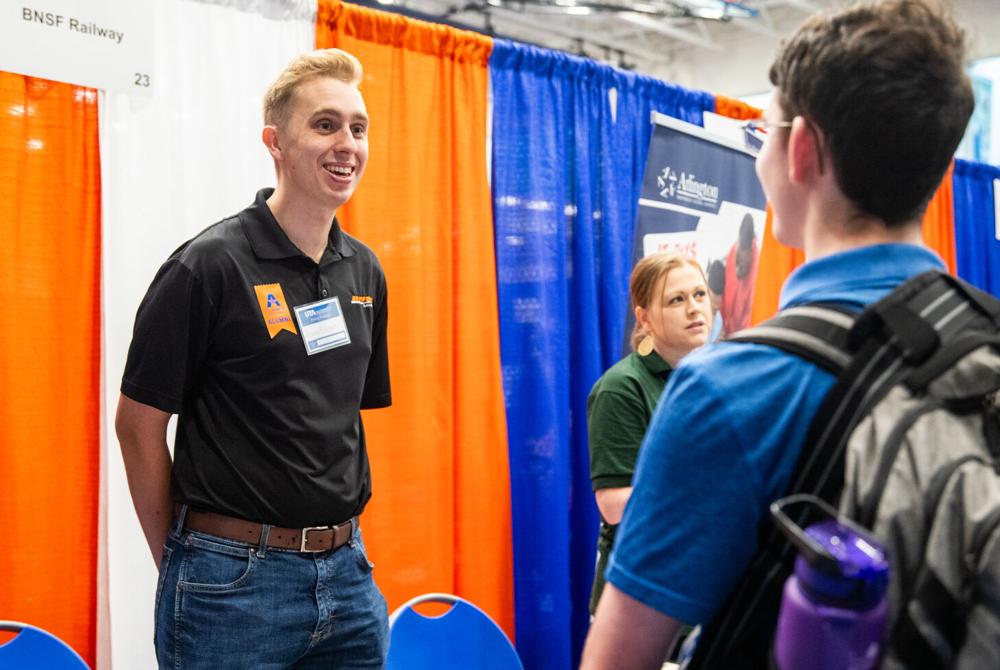
- College of Business promotes career mindset in students with new programThe College of Business recently launched its career coaching program to support students as they prepare for life after graduation. The program is intended for students in their senior year who have declared their major, and the primary purpose is to get them career-focused, said Scott Elbert, College of Business senior director of academic advising. April Simmons, College of Business corporate relations coordinator, said the program was developed over the summer to help students obtain internships and career opportunities, and goes beyond just helping with resumes and interview skills. “It’s to really dig deep and find out what it is that they want to do careerwise after they’ve left the university,” Simmons said. “Instead of just saying they want to do accounting, what exactly is it that they want to do within the realm of accounting.” Once a student signs up for a session, an email is automatically generated with two tasks: The first prompts students to upload their resume into VMock, a tool that will critique the document. For the second task, students will upload their LinkedIn profiles to the same software to get feedback. Once both items are complete, students are ready for their appointment, Elbert said. He said the program started because of feedback from a yearly graduating seniors exit survey. One of the main points of feedback, he said, was students asking for more career engagement opportunities, employers coming to campus, opportunities to connect with corporate partners and internship connections. “I think in some cases students aren’t sure if those surveys are being read and considered, and I can tell you for sure that they absolutely are,” he said. “It is student feedback that really drove this initiative and this desire for us to go and provide this kind of service.” @tay._.sansom news-editor.shorthorn@uta.edu
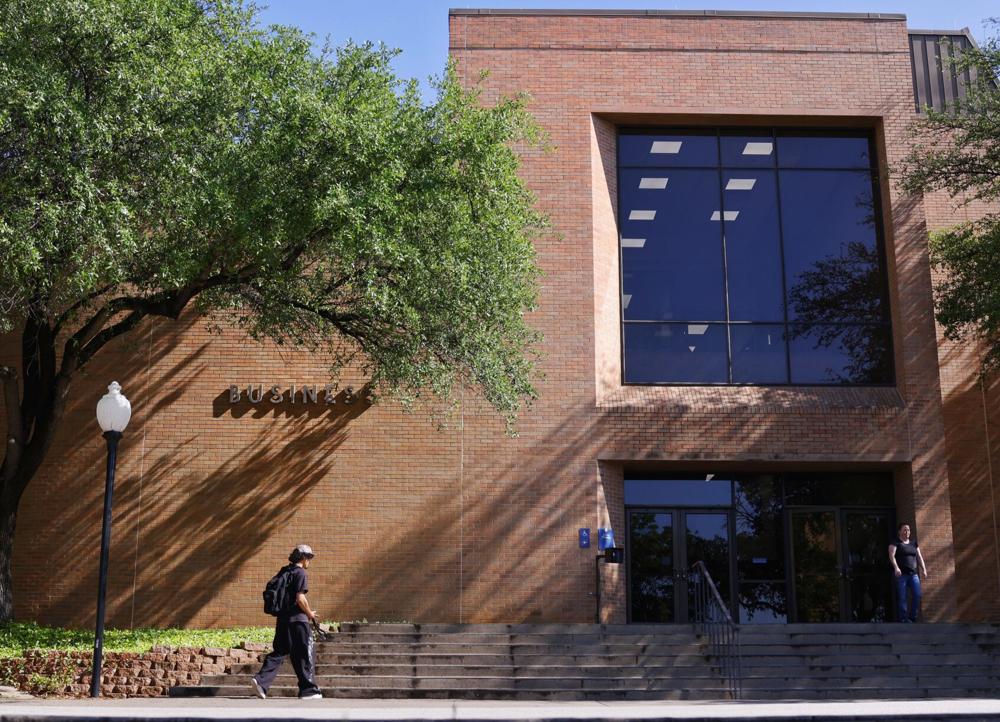
- Arlington City Council to vote to amend antidiscrimination chapter of city codeOn Tuesday, the Arlington City Council will vote to amend the recently suspended antidiscrimination chapter in the city’s code. At the Sept. 9 meeting, the council voted to temporarily suspend the chapter and will now vote on the first hearing of an amendment that would allow it to continue without affecting federal funding. City Manager Trey Yelverton said at the Sept. 2 council meeting that $65 million in federal grants that come to the city were at risk due to contents of the chapter. These grants support programs such as housing assistance, firefighter grants, Via and Handitran. The city could have lost access to these grants due to an executive order signed by President Donald Trump called “Ending Radical And Wasteful Government DEI Programs And Preferencing,” federal court decisions and recent Texas legislation. Yelverton said that as the city receives the grants, it has to enter into a contract with the federal government or the granting agency, which stipulates activities that the city can or cannot do. “These contracts now are being updated, particularly at the federal government, to include prohibitions for advancing or promoting DEI, as well as any type of race use gender as part of decision-making process based on allocating funds or benefits,” he said. The new ordinance affects multiple subsections of the original antidiscrimination chapter and deletes mention of sexual orientation, gender identity or gender expression as protected characteristics from the original document. If the new ordinance passes, the chapter will continue to prohibit forms of discrimination in employment, housing and public accommodations based on race, color, national origin, age, religion, sex or disability, according to a staff report. “We can set the example in Arlington to say, ‘Listen, we’re going to adhere to the laws of the land, and we’re still going to show you what love, decency and respect truly is,’” Mayor Jim Ross said at the Sept. 2 council meeting. @wall035203 news-editor.shorthorn@uta.edu
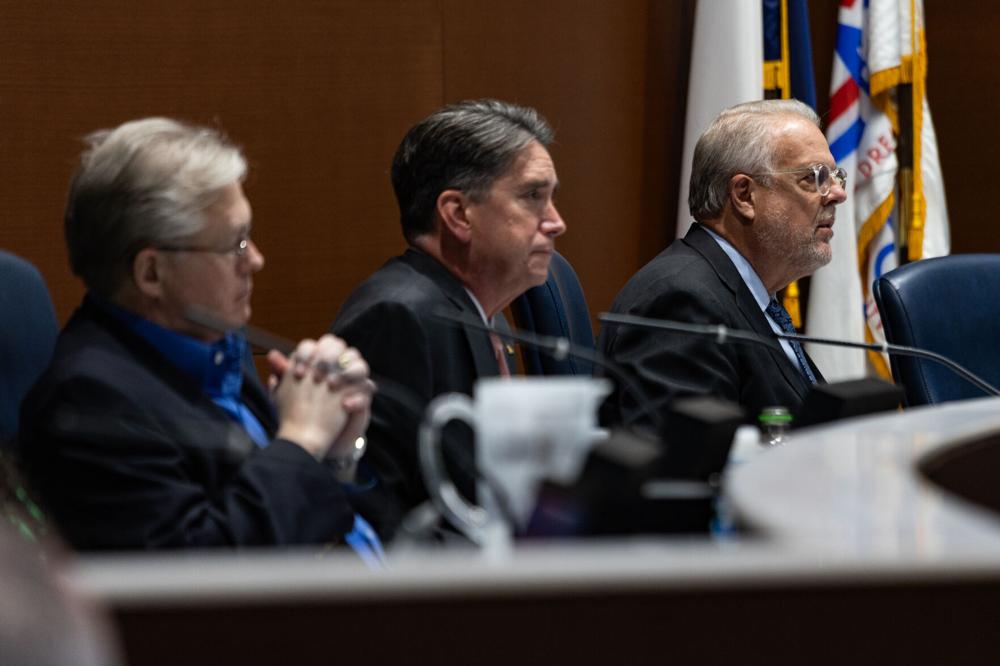
- UTA establishes interim advisory body to replace now-dissolved Faculty SenateUTA is establishing an interim faculty advisory body as a replacement for the now-dissolved Faculty Senate, President Jennifer Cowley told The Shorthorn. The new group — called Interim University Faculty Roundtable — will review policy changes and budget planning, engage with other faculty members and oversee four faculty working groups responsible for students’ academic experiences. The roundtable’s decisions are nonbinding. In August, the UT System Board of Regents authorized university presidents to establish faculty advisory groups to replace faculty senates. The decision affects all 14 institutions within the system, including UTA. The system is working to comply with a part of Senate Bill 37, a new law that shrinks the power of faculty senates by restructuring them or allowing existing ones to be abolished by Sept. 1. Under SB 37, faculty senates are only permitted to function as advisory groups, and any proposed changes must be approved through an institution's governing body, such as the UT System. Universities opting to keep their faculty senates have to adapt them to comply with the law. Before its dissolution, Cowley tasked the Faculty Senate with nominating candidates for the new panel, she said. The group will include 12 faculty members from various departments with experience in shared governance. UTA’s Faculty Senate had more than 70 faculty members, according to the group’s website. Cowley said forming an interim advisory group provides a way to respond to faculty’s concerns. She cited a recent survey where faculty noted heavy workloads from serving on committees, volunteering or advising student organizations with little visible impact. “For me, seeing this interim body, it's an opportunity to have conversation with our faculty about whatever we design for the future, make sure that we're addressing those concerns about having too much service and not the right ways to create impact,” Cowley said. In a Sept. 5 co-signed email to faculty members, Cowley and Tamara Brown, provost and senior vice president for Academic Affairs, acknowledged that the structure cannot “fully replicate what came before” but said they believed that new changes will bring both questions and opportunities to make impact. “How we work together must look different and take new forms,” the email reads. “But the values of faculty voice, leadership, and partnership will remain at the heart of UTA’s work.” The advisory group will perform similar functions as a faculty senate or council to maintain an institution’s operations. For UTA, such duties have included pushes for standardized pay raises and for a continuation of the presidential search process after COVID-19, which led to the hiring of Cowley. In recent weeks, the governing boards of University of North Texas and Texas Tech University modified their faculty senates to comply with state law. Texas A&M and Texas State regents dissolved faculty senates, similarly to the UT System. Faculty senates typically are the only group on campus where faculty representatives make recommendations after they have had conversations with students, staff and administrators, said Brian Evans, president of the Texas Conference of the American Association of University Professors, also speaking for himself. Evans has concerns about faculty advisory groups falling under administrative control, but said they’re better than having no representative body. “It's going to be a muzzled voice of the elected faculty, but at least there's some voice there,” Evans said. The UTA Faculty Senate had always served in an advisory capacity, Cowley said. The university also had undergraduate and graduate assemblies that provided policy recommendations on curriculum and academic progress. Those assemblies also officially dissolved under SB 37. Two committees — the Hearing Panel and the University Tenure and Promotion Committee — will be reconstituted as appointed bodies rather than elected. The interim body will shape the future structure of a potential permanent faculty senate as UTA anticipates a regents’ ruling, Cowley said. Kevin Eltife, UT System board chairman, said at the Aug. 21 meeting that regents will decide if and when faculty senates will be re-established on campuses and that they will proceed “deliberately.” “We are going to take our time. We're going to go slow. We're going to figure out the best approach if we're going to have these faculty senates on every campus or not,” Eltife said. “Some may not have them. We don't know yet.” @DangHLe news-editor.shorthorn@uta.edu
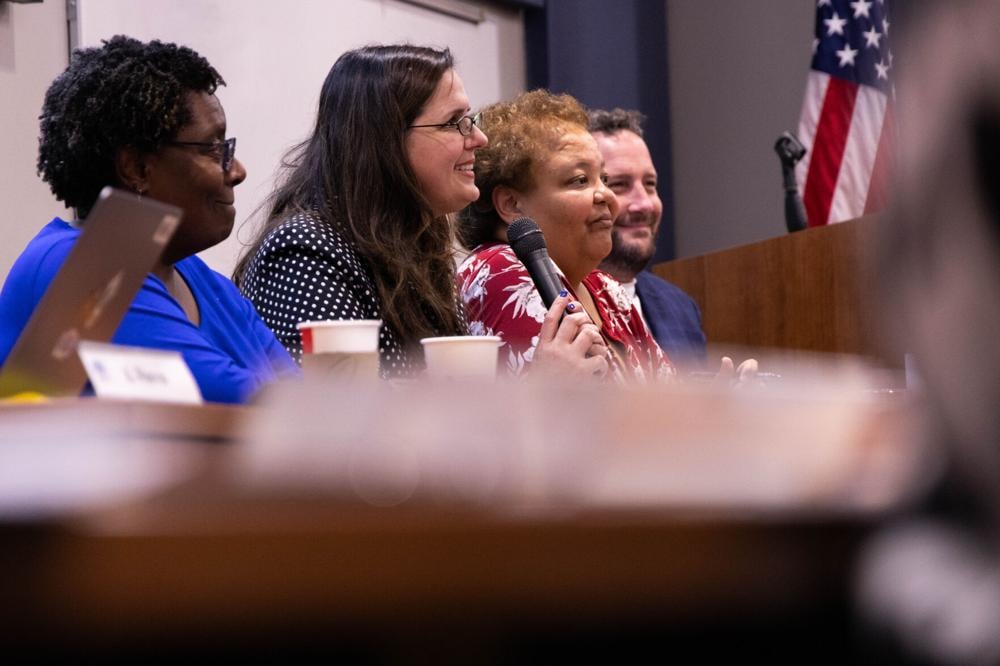
- Warm temperatures, low rain chances expected in Dallas-Fort Worth this weekDallas-Fort Worth residents can expect high temperatures in the 90s and low chances of rain later in the week. Monique Sellers, National Weather Service meteorologist, said that the weather is still warm and humid, and residents should be aware of the heat when outside. Beginning midweek, there are some chances of rain, but they’re on the low side, Sellers said. “Not really expecting a big temperature change with those rain chances,” she said. “Still going to be sitting in the 90s through the end of the week and through the weekend as well.” @atclements03 news-editor.shorthorn@uta.edu

- El Baile event to celebrate Hispanic Heritage Month, Mexican Independence DayLa Sociedad Hispánica will be hosting El Baile from 6 to 9 p.m. Sunday at Brazos Park. The event will kick off Hispanic Heritage Month at UTA and celebrate Mexican Independence Day with the intent of bringing students, alumni and the community together, said Emmanuel Hernandez, La Sociedad Hispánica president, in an email. The evening will feature an introductory speech from Hernandez and a speech from Maria Delgado, senior director of the Hispanic Serving Institution Initiatives. The event will also have a live DJ performing Latin music, an ice truck selling slushies and lemonade, a mechanical bull and cultural foods like chicharrones. Salsa at the Gardens, a group of UTA alumni, will be teaching salsa dancing from 7 to 7:45 p.m., Hernandez said. Brazos Park will be decorated with Mexican decorations and attendees are encouraged to dress in Mexican attire, he said. “By just coming to one event, which is El Baile, you can make unforgettable memories,” Hernandez said. @ATClements03 news-editor.shorthorn@uta.edu
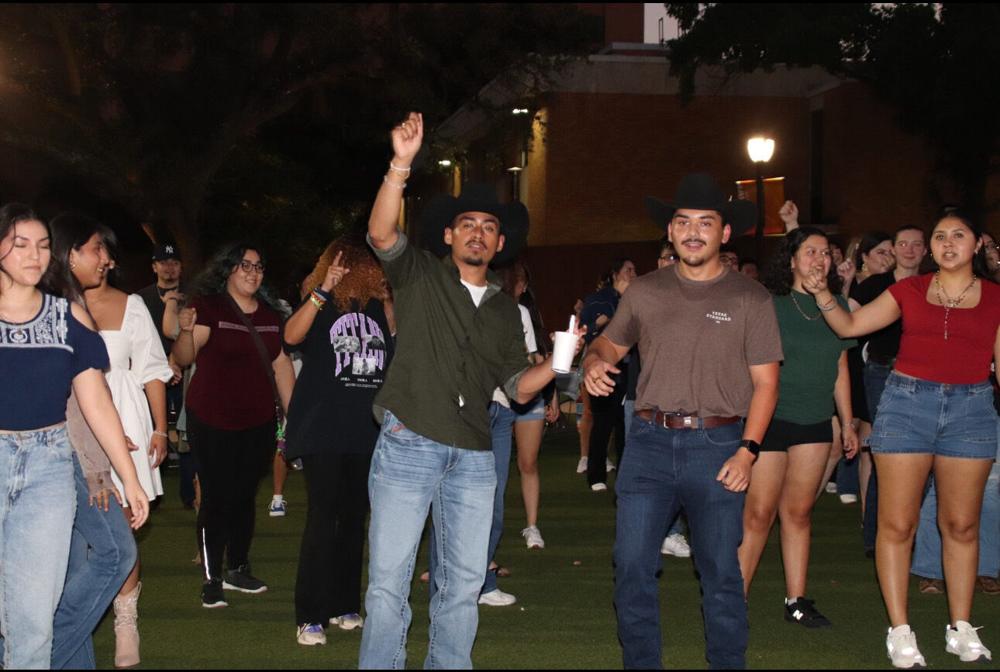
- UTA President Jennifer Cowley delivers annual State of the University addressStudents, faculty and staff gathered Thursday for UTA President Jennifer Cowley’s annual State of the University address at Texas Hall. During the address, Cowley covered a wide range of topics, from academic expansion, such as a new doctoral program pending state approval, to ongoing issues such as campus parking. Parking The fall semester brought the highest demand for parking in the university's history, Cowley said. As a result, UTA added flexible parking options, reallocating parking spaces and communicating with permit holders. The Parking and Transportation Services office added 400 spaces to the South and East Zones and allocated about 50 unused staff parking spots in Lot 34 to the West Zone, according to previous Shorthorn reporting. “Your voices are shaping these responses, and I promise it's going to get a little bit better in the spring,” Cowley said. Grants and Investments The College of Nursing and Health Innovation recently received a $5.1 million grant from the Nursing Shortage Reduction Program, which lets the college expand its partnerships with school districts to create nursing academies in high schools, allowing students to begin earning credit toward nursing degrees. The UT System also approved the allocation of $126 million over three years to support improvements in existing buildings, providing resources to replace rooms, upgrade electrical systems and modernize classrooms. Programs and research During the fall, UTA launched two bachelor’s degree programs in hospitality management, new minors in philanthropy and space systems, and academic tracks in the graduate nurse practitioner program and undergraduate theater arts program. Pending state approval, the university is set to launch a social work doctoral program, aimed at addressing the need for social work leaders, Cowley said. With the growth of artificial intelligence and the boom of data centers, presidential distinguished professor Dereje Agonafer is leading a U.S. Department of Energy-funded project to reduce the energy consumption to less than 5%. Flag football The university is planning to launch the first Division I women’s flag football team in Texas, set to begin play in the spring of 2027. Athletics director Jon Fagg is in the process of recruiting the first coach for the team. Student, faculty and staff support Starting this fall semester, the family income threshold for the Blaze Forward Program rose from $85,000 to $100,000, providing 60% of all full-time undergraduate students coverage for mandatory fees and tuition. This fall, UTA is launching a new peer-to-peer recognition program, where faculty and staff can fill out a digital card to celebrate the work of their colleagues. “Consider it the digital equivalent of a gold star,” Cowley said. Tamara Brown, UTA provost and senior vice president for Academic Affairs, shared in a speech that the Communities Foundation of Texas awarded Emerging Mavericks, a program designed to support students with lived experience in foster care or homelessness, with a $250,000 grant aimed at improving and expanding the mission of supporting the student population. “These support systems are directly strengthening our students' ability to stay enrolled, persist through the challenges and graduate on time, ultimately improving our retention and preparing them to enter the work force, ready to excel,” Brown said. @tay._.sansom news-editor.shorthorn@uta.edu

- New spirituality in medicine class explores human connectionA new class, spirituality in medicine, has made its way into the medical humanities curriculum, allowing students to explore human connection in medicine in a way UTA has never done before. Dr. Steven Gellman was a family doctor for 31 years, and he said in that time, patients would often complain about the lack of empathy and understanding they received from other doctors, saying those doctors saw them as nothing more than a lab or X-ray that needed to be done. Gellman said these interactions left him wanting a better future for medicine, so he took it upon himself to make it happen. In 2018, Gellman presented to the College of Liberal Arts the idea of forming a medical humanities program, which would teach students about bedside manners, how to treat patients and how to bond with them. Seven years and seven new classes later, Gellman and Kenneth Williford, associate professor and chair of the Department of Philosophy and Humanities, introduced spirituality in medicine to UTA students for the first time in school history. The course is a team-taught class that features 14 guest teachers, including current UTA faculty, as well as hospital chaplains and retired theology professors, all with diverse backgrounds. Gellman said the class is not a memorization class, unlike a lot of premed courses. It is more about deep thinking. “What's important to you? What are your biases? So when you see another patient, you understand who you are, so you can relate better to them and put your biases aside,” he said. Students do writing assignments and participate in discussions in class. The course ends with a final creative project at the Central Library FabLab with the help of experiential learning librarian Chloé Bennett. It aims to highlight the connection between a student’s own spirituality and the spirituality in medicine. Gellman said that all of his classes incorporate a creative project. “It’s going to be a terrific opportunity for a little different kind of creativity, but still relevant to the course and allow students to really get involved,” Gellman said. Pre-nursing sophomore Jennifer Salgado said she heard good things about Gellman and was recommended the class by one of her public health teachers. She said the class has allowed her to explore in a way other classes haven't the difference between spirituality and religion and how both can affect patient care. “It really impacts the way someone can be taken care of,” Salgado said. “If you take into account people's religion and spirituality, I feel like that can really benefit them or maybe make their experience better.” Salgado used the example of Jehovah's Witnesses not being able to accept blood transfusions due to their beliefs as an example of how a patient’s beliefs can affect their care. She said a physician can provide better care if they can understand and see the person for who they are. Pre-nursing sophomore Thomas Puentes shared similar sentiments and said understanding a patient's background, culture or beliefs and having a sense of who a person is helps build that connection. “You’re not just treating people, like their illness, you're treating their spirit in a way,” Puentes said. Puentes said his experience when getting surgery wasn't great, feeling like the doctors never considered his feelings in the matter and were only worried about getting the surgery and post-op done. After three weeks in the class, Puentes said he came to realize that it can change the way doctors treat patients not only by helping them feel better, but also by making them feel better about themselves and keeping their identity intact. On Sept. 4, before introducing guest speaker Dr. Thuthuy Nguyen, the class began the same way every class does, with a song from the class playlist. Each student submitted a song they felt spoke to them. Nguyen then led an interactive discussion where the class explored what spirituality meant to them, the real-world implications of spirituality in medical practice and how students can use spirituality to reduce stress as future medical professionals. After some discussion, Nguyen asked the class to close their eyes and led them through a meditative exercise. As the students sat there, the humming of the air conditioner filled the room as they took deep breaths while Nguyen talked them through the path oxygen takes through the body. “As these molecules traverse down your trachea into your lungs, it hits the alveoli, where there's gas exchange and you get oxygen molecules that travel into the heart that pumps these molecules of good red oxygen to the rest of your body,” Nguyen said. Later in the semester, guest speaker Eli Shupe, co-director of the medical humanities and bioethics program and philosophy and humanities assistant professor at UTA, will talk about postmortem issues and how different religious groups view what happens to the body after death, giving students another view of spirituality in medicine. With the addition of more classes in the medical humanities, the department offers a minor and a certificate that students can sign up. “It’s blossomed into a really large and growing program,” Shupe said. A student club, Mavericks for Medical Humanities, has also formed, as well as a creative journal, called Stimulus, where students can submit creative work to be published. Gellman said the Liberal Arts Dean Office and philosophy department have offered tremendous encouragement and support, as well as invaluable assistance to the growth of the medical humanities program. “I came here with a vision,” Gellman said. “The vision was to improve the future of health care. So I know that sounds pretty idealistic and maybe kind of naive, but that was my vision, and this is how I'm doing it.” @wall035203 @diegocllazo news-editor.shorthorn@uta.edu
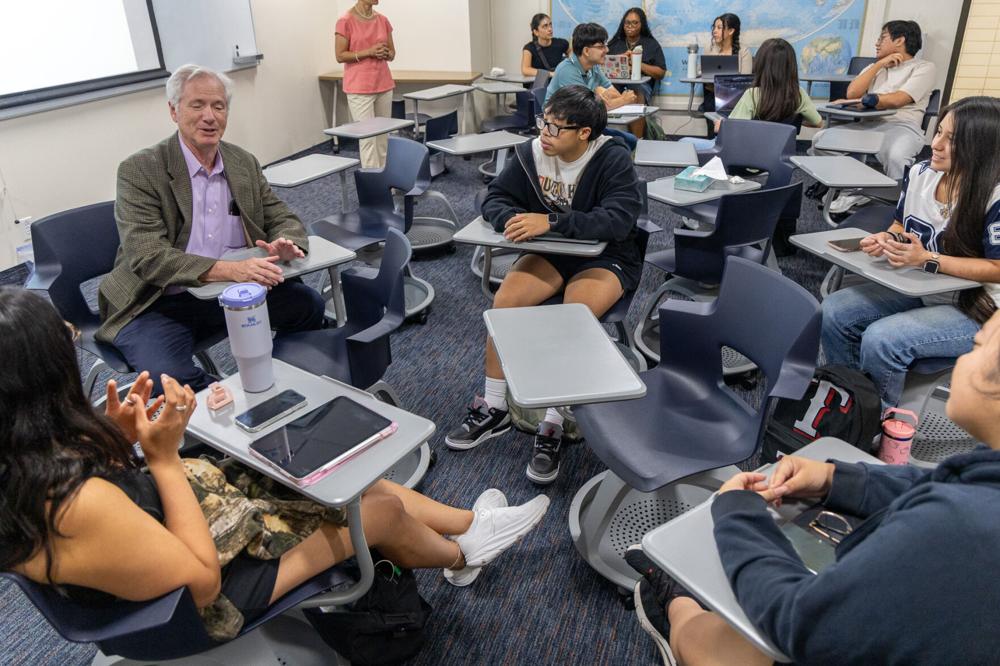
- World Fusion Festival to bring community together through cultureExcel Campus Activities is hosting the World Fusion Festival from 5 to 8 p.m. Thursday in the Bluebonnet Ballroom. The event is a celebration of diverse cultures through the blend of art, music and dancing. Attendees are encouraged to wear traditional clothing from their cultures. The event will feature a dance floor in the center of the room, performances from the Korean Culture Association and Viberance The Band, along with tabling from MavTHAT ASL Club, Japanese Culture Society, Study Abroad and Global Engagement. Food from across the globe will be available, and tables will have possible giveaways. Elizabeth Gonzales, computer science sophomore and EXCEL programming director, said it’s important for people to recognize how diverse UTA is so students can appreciate and have a better understanding of one another. Gonzales said she thinks the event provides everyone a place where they can come together and get to know one another. @tay._.sansom news-editor.shorthorn@uta.edu

- Conservative activist Charlie Kirk shot and killed at university event in UtahCharlie Kirk, founder of conservative organization Turning Point USA, was shot and killed Wednesday during a Utah Valley University event in what state officials are calling a “political assassination.” Authorities said Friday that they arrested suspect Tyler Robinson, 22, according to the Associated Press. A court affidavit says that Robinson is under suspicion of aggravated murder, felony discharge of a firearm causing serious bodily harm and obstruction of justice charges. “No one understood or had the Heart of the Youth in the United States of America better than Charlie,” President Donald Trump said in a social media post honoring Kirk and his family. At the age of 18, Kirk co-founded Turning Point USA, a nonprofit organization with a mission to identify, educate, train and organize students to promote the principles of fiscal responsibility, free markets and limited government, according to the BBC and the Turning Point USA website. For many, Kirk and Turning Point became the symbolic face of the young conservative moment. He was also known for his podcast, the Charlie Kirk Show, and for holding outdoor debates on college campuses around the country with students on controversial topics. In honor of Kirk, Trump ordered all American flags throughout the U.S. to be lowered to half-staff until 6 p.m. Sunday, according to an X post from the White House. The conservative advocate’s death sparked an outcry from elected officials and stakeholders from both sides of the political spectrum. Texas Gov. Greg Abbott said in a post on X that he and his wife, Cecilia Abbott, were heartbroken by the assassination. “Charlie’s voice was a beacon for millions of young Americans searching for truth, courage, and conviction,” Abbott said. “This senseless act of violence has no place in America.” California Gov. Gavin Newsom, who has been critical of Abbott and Trump’s policies and congressional redistricting, shared a similar sentiment regarding Kirk’s death. “The attack on Charlie Kirk is disgusting, vile, and reprehensible,” Newsom said in a post on X. Several former presidents and local politicians also made statements expressing their shock and honoring Kirk’s life. Former President Barack Obama said in a post on X that he and his wife, Michelle Obama, would be praying for Kirk’s family, especially for his wife and two young children. “We don’t yet know what motivated the person who shot and killed Charlie Kirk, but this kind of despicable violence has no place in our democracy,” Obama said in the post. Former President George W. Bush said in a post on Instagram that members of other political parties are not the enemy; they are fellow citizens. He ended the post asking God to “guide America toward civility.” Tarrant County Judge Tim O’Hare also acknowledged the death of Kirk in a Facebook post. “He loved America and spoke to millions about his beliefs,” O’Hare shared in the post. “This is a terribly troubling time for America.” @PMalkomes @_.lexlie_ @tay._.sansom @wall035203 news-editor.shorthorn@uta.edu

- 'We climb because they climbed': First responders honor 9/11DALLAS — Lt. David Christie leaned onto the concrete floor, panting. He had just reached the 49th floor of the Comerica Bank Tower in Dallas — halfway through Saturday’s 9/11 Memorial Stair Climb. Sweat trickled down the Arlington firefighter’s forehead between heavy breaths. His lanyard, containing the photo and name of a first responder who died during the attacks on 9/11, dangled from his damp, tobacco-colored bunker gear. Every participant was assigned one, tasked with symbolically completing the climb for them. Christie carried the memory of New York City firefighter Dennis O’Berg, who had only been out of the fire academy for six months on 9/11, and was recently married before the tragedy. O’Berg’s body was never found, and his family held an open-casket funeral. “As hard as I feel, those guys felt tired, and they still had a job to do,” Christie said. Like Dallas’ ceremonial climb last weekend, first responders across the nation stop to honor the victims and survivors of 9/11 every year as the anniversary draws near. Many of them still vividly recall the day. The attacks killed 2,976 people and injured thousands more, according to the FBI. Many first responders are still facing adverse health effects from working in toxic conditions. The adversity, however, strengthened bonds among first responder communities. The Arlington Fire Department and other stations across Dallas-Fort Worth continue to honor the fallen by climbing and remembering — together. Lt. Adam Evans, Arlington Fire Department public information officer, said recalling how many people lost their lives on 9/11 made him realize how much he takes for granted day to day. It’s important to commemorate the bravery and sacrifice exemplified by those who died on 9/11, Evans said. “They paid the ultimate price, and several of them probably knew what they were going into and knew they probably weren't coming back. But that's the job, that’s what we signed up for,” he said. Evans was still a young firefighter early into his career on 9/11. He was stationed in Arlington Fire Station 2, which was the city’s busiest at the time. Seeing everything unfold was “eye-opening,” Evans said. He was off-duty the day of the attack, sitting with his mother-in-law drinking coffee. She told Evans that a plane had struck the World Trade Center, but he thought the situation was an accident. As he discussed what was happening with his mother-in-law, the second plane hit. Evans still did not realize it was an act of terrorism. “That's when she looked at me and said, ‘We're under attack,’” Evans said. “I'll never forget — just telling me that then gave me goosebumps, remembering that,” Evans said. After 9/11, Evans said first responders began training, preparing and thinking about emergencies differently. They realized they have to be ready for anything. “It brought, for the first time, a lot of awareness to terrorism and large-scale disasters and the importance of interagency cooperation,” he said. On Sept. 6, hundreds of first responders gathered at Main Street Garden Park for the annual Dallas 9/11 Memorial Stair Climb. The ceremony has participants wear protective gear while climbing the Comerica Bank Tower to honor the fallen. While participants climb, radio chatter is played throughout the stairwells to simulate what first responders experienced at the World Trade Center. The first recorded 9/11 stair climb took place in 2003, according to the Dallas 9/11 Memorial Stair Climb’s website. Since then, the practice has grown into a nationwide tradition with ceremonial climbs being held from New York to California. Before Dallas’s climb, first responders lined up about a block away from the Comerica Bank Tower for a moment of silence and the performance of the national anthem. Heads tilted downward as many glanced at their lanyards, each representing one of the 343 firefighters who died on 9/11. They all came from different first responder groups, but they climbed for one reason. “The further away we get from 2001, it's important to keep the sacrifices of everybody alive,” Christie said before the climb. When the waves of orange and yellow began their ascent up the tower, it didn’t take long for them to feel the weight of their gear. Climbers would stop to rest at certain floors and were given water, cold towels and fruits. By the 21st floor, some participants were dripping sweat, while others took deep breaths before continuing upward. By the 49th, many took their gear off and collapsed onto the floor for a break, before taking an elevator down to the first floor and doing it all over again. By the time climbers began finishing, many could barely stand. The gear was not the only thing weighing them down. “That little name tag that they gave us to carry to the top weighs more than all this gear,” said Milton Schober, Woodrow Fire Department firefighter. Joshua Jones, Arlington Fire Department lieutenant, said while they climbed for a memorial, people on 9/11 climbed out of duty to save lives, and they could not take any breaks. “I keep telling myself, they kept climbing, so we got to as well,” Jones said. He found a lot of similarities with the first responder on his lanyard that he was climbing for, he said. Jones did research and found out his assigned first responder was an avid runner and worked as an engine, which means he carried the water hose on the job. Jones was both of those as well. “I hope that I honored him in a way that his family would be proud — that he would be proud,” Jones said. @PMalkomes news-editor.shorthorn@uta.edu
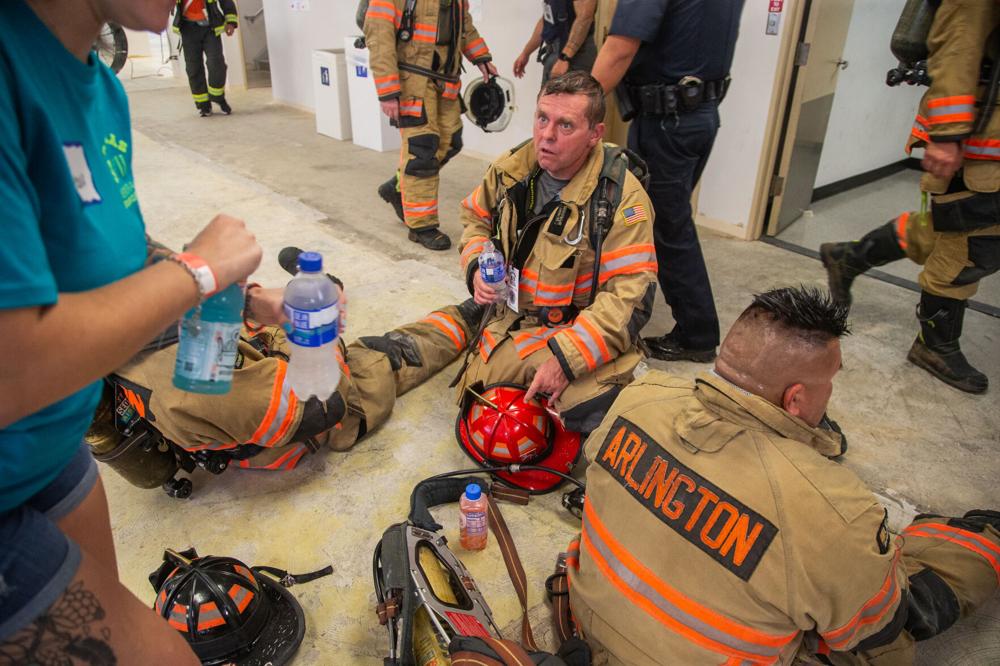
- Oozeball set for Sept. 19, registration ends TuesdayThe deadline to register for Oozeball, UTA’s annual mud volleyball tournament, is 9 a.m. Tuesday, with the event set for Sept. 19. Students can register online or at the Maverick Activities Center services and information desk, and it is $60 per team or $15 per individual. Late entries will be placed on a waiting list. The event will take place on the corner of Summit Avenue and Greek Row. Josh Hale, sports programs assistant director, said team captains can expect to receive schedules Sept. 18. Games are six-on-six and played to 11 points, with a fifteen-minute time limit. The rules are similar to traditional volleyball games, with a few differences: Teams must have at least two female players, and matches can begin with five players. Hale said that the tournament has grown in popularity among students and faculty. “It’s just one of those unique events that we love getting to program every year for our students here at UTA,” he said. @taylormakynzee news-editor.shorthorn@uta.edu

- Community mourns death of Les Riding-In, Native American Student Association adviserLes Riding-In, Native American Student Association primary adviser and College of Business graduate recruiter who worked at UTA for almost 20 years, died at 53 years old on Aug. 29. Riding-In was involved in many groups at UTA and outside of the university. He was a chair of the UTA Native American Employee Resource Group, as well as a trustee for the Pawnee Nation College in Oklahoma. Friends and colleagues said Riding-In was an intelligent man with a bigger-than-life personality and always had a smile on his face. He had a particular sense of humor and cared about the students he advised, with the Native American Student Association and outside of the group, as well as the greater Native American communities. “He was always present at every event that was possible in the Native community, and that of course was not a requirement of his job,” said Annette Anderson, social worker and secretary of the Indigenous Institute of the Americas. “It was just who he was as a person.” Scott Langston, former Texas Christian University Native American nations and communities liaison, said that while universities can be competitive, especially with programs so similar, Riding-In was not like that. “He showed up to events at TCU; that was so encouraging, especially as we were in our early years trying to get established in our work with Native communities,” Langston said. During his time at UTA, Riding-In helped lead many accomplishments, including the Wichita and affiliated tribes land acknowledgement; the creation of the UTA Land Acknowledgement Courtyard, with a garden of indigenous plants and trees; and the continued growth of the annual student-led Benefit Powwow. Ken Roemer, English professor emeritus and former Native American Student Association adviser, said that he had been advocating for a space for Native students and faculty around the Roundhouse Planetarium, but it was Riding-In who advocated for the land acknowledgement. “Les was not just the chair of that land acknowledgement committee, he was the one who really started [the] push,” Roemer said. Stephen Silva-Brave, Native American Student Association president, said Riding-In made sure that the actual tribes that were in the land acknowledgement had representatives in its writing process. “He knew that we can’t just write about these people, we gotta bring them in, get their sign-off on it,” Silva-Brave said. Riding-In also played a big role in promoting the area where the land acknowledgement took place and making it into the Land Acknowledgement Courtyard. “A physical place on campus that was dedicated to Indigenous people, I felt like that was huge,” Silva-Brave said. “We’re such a small part, a small organization, a small population within the university, and he still made sure to get us real estate on campus.” With the courtyard, a garden was also added, featuring a variety of native plants. Anderson said Riding-In opened the door to let the university know that there needed to be a cedar tree in the garden for it to truly be a medicine garden. She said the university didn’t like the idea of having cedar trees on campus, but for Native Americans, cedar is an important medicinal plant. On the day of the garden’s opening, the cedar tree was there, and Anderson said her heart was bursting with joy. “I know that had to do with Les opening the door to say, ‘OK, you want to put in a quote ‘Native garden,’ but where’s your Native voice?’” she said. Riding-In also helped keep the Native American Student Organization’s annual Benefit Powwow running smoothly throughout the years. Silva-Brave said that if people didn’t already know him, they wouldn't know that he was one of the people to bring the event together every year. “Over the last three years, Les didn’t even get on the microphone one time. He let the students take the lead,” he said. “That was him.” Robert Caldwell, professor of Indigenous studies at the University at Buffalo in New York and former Native American Student Association president at UTA, said he met Riding-In almost immediately after showing up to UTA for a doctoral program in history. “He was one of the first people that I met, and he kind of took me under his wing and introduced me to much of the Native community around Dallas, definitely all of the folks on campus,” Caldwell said. He said it was invaluable to have a person like Riding-In around when navigating a new place. “He could focus in and help solve all kinds of problems. He was always helpful. I say that he was helpful to Native students, but really he’s helpful to all students,” Caldwell said. “He had a way of challenging people to be their best.” “He’s going to be sorely missed, not just at UTA, but across the country.” @wall035203 news-editor.shorthorn@uta.edu
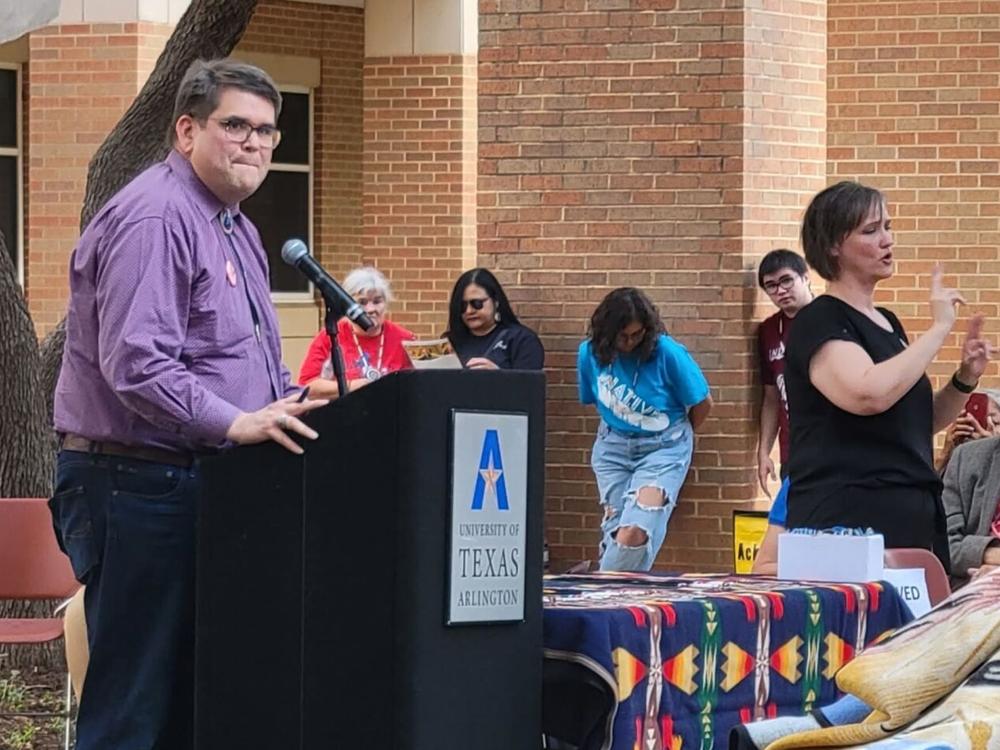
- Parking and Transportation Services shares information about parking on campus, students commentRising enrollment and a record number of permits sold have left UTA students struggling to find a space on campus. Parking and Transportation Services stated in a Reddit post that 22,000 permits were sold in August, a 5% increase from the previous year, making this the largest parking group in UTA history. In 2021, only 8,000 permits were sold. With only 12,000 spaces available for students, parking has been an issue for many this semester. Around 400 parking spaces were also lost with the construction of Maverick Hall, parking communications manager, Larry Cummings III said. As the campus continues to grow and with freshmen enrollment at an all-time high, the Parking and Transportation office has had to adapt how parking is handled. This led to the implementation of the new pilot program. The pilot program allows students to pick a parking zone in an effort to reduce overcrowding in lots that fill up early in the semester. For the first time, the office capped the number of commuter permits in each zone to ensure there would be space for every permit holder. The cap led to general commuter permits selling out for the first time ever, officials said in the Reddit post. Cummings said he would observe students gravitate toward the south lots in previous years, watching them circle a full lot in hopes of catching someone leaving. “Our goal with that was to spread people out, introduce them to new parking areas,” he said. A waitlist was also created to let students swap zones and introduced a daily swap option, allowing east and west commuters to use south and west lots on certain days. Cummings said every request has been approved and noted parking enforcement has been lenient with tickets as the parking gets resolved. While the zone system is temporary — leaving in four to six weeks — Parking and Transportation Services stated it's been successful in its goal to avoid circling and spreading students out. Officials acknowledge that the pilot program was not perfect. The statement said the West Zone should have been capped earlier, as overflow into nearby lots made the first weeks especially difficult. It also said that while every zone maintained back-row availability 99% of the time, students still circle the front rows, creating longer waits and more frustration. Many students, however, say their parking experience has been problematic. Computer science senior Khoi Tran and biology sophomore Khuien Tran, siblings who commute together, said parking is worse than it's ever been, often feeling like they are competing for spots. It often takes them 40-50 minutes to find a spot, making them late or miss class, Khoi Tran said. When they do find a spot, Khoi Tran said, the long walk in Texas heat is unforgiving. “We end up having to park at the stadium on the far west side of campus, and usually the walk from there is about 30 minutes to class,” Khoi Tran said. In response to the new zoning rules, Khuien Tran said she feels she's circling more, just in smaller lots. Khoi Tran said they have even tried getting to class two hours early and still find themselves circling the lots. Other students say their parking experience hasn't been frustrating but question the university's development decisions. Computer science senior Kaitlin Martin, who commutes an hour to school, said it was confusing to see UTA build a new dormitory without additional parking. “I assumed they were going to get their own parking area,” Martin said. “That parking garage, even before the dorm was built, was already pretty much full capacity with just daily student commutes.” The parking office added an additional 400 spaces to the South and East Zones and allocated about 50 unused staff parking spots in Lot 34 to the West Zone. Parking officials said they will continue working with Student Government and the Parking Advisory Committee to review the pilot program. They will decide whether capping zones earlier or steering more drivers to reduced-rate and remote options is the best short-term solution. For now, no new parking projects have been approved, Cummings said. “Parking will never feel perfect on a college campus — close enough, cheap enough or available enough for everyone — but we do work hard to keep two white lines open for you when you arrive and help you find them easily,” the office wrote in a post. @diegocllazo news-editor.shorthorn@uta.edu
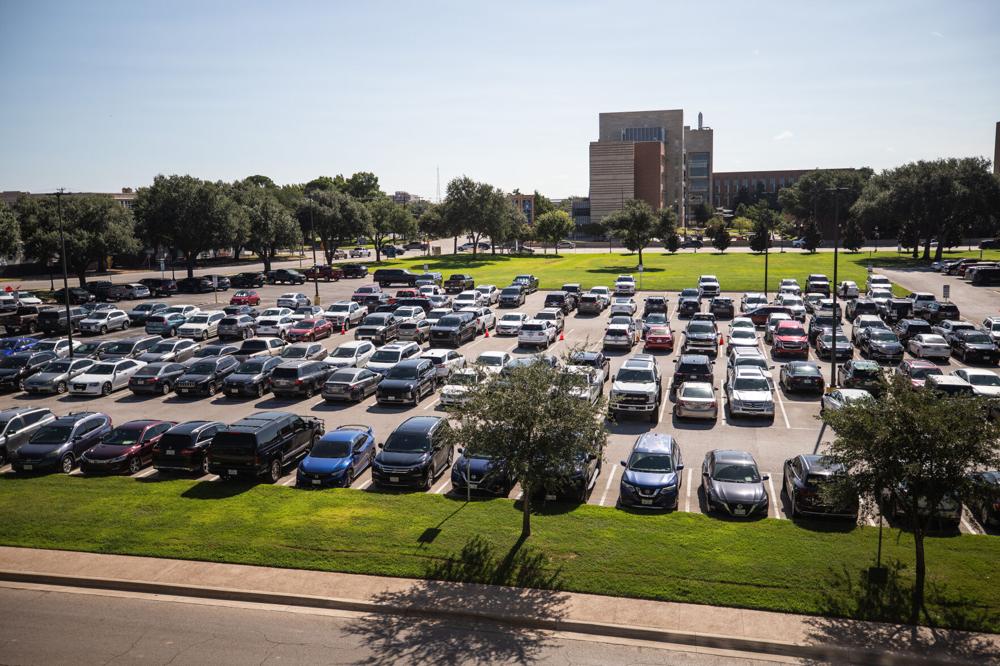
- Sororities welcome new members into sisterhood with Bid DayAlpha Chi Omega, Delta Delta Delta and Delta Zeta lined up Monday at the grassy lawn of the Greek Life Center for Bid Day. Fall primary recruitment went for about a week and is a mutual process, where potential members get to meet with the different groups. The first part of the process is orientation, then philanthropy, then preference, where potential members meet with sorority members, and finally Bid Day. Zeta Tau Alpha was in attendance as spectators and will be returning to campus this semester. Economics senior Shelbi Griffin, College Panhellenic Council vice president of recruitment, said the council started planning the recruitment weekend at the beginning of last semester, and said the event is a celebration of bringing new people into the sororities' sisterhoods. Women ran and cheered as they opened their yellow envelopes with their future sororities. Aerospace engineering freshman Brea Sherman said that when she opened her letter, she screamed so hard she almost passed out. “My first reaction was ‘I’m not hallucinating, right?’” she said. Sherman said she rushed because she wanted to get out of her comfort zone, and her mother encouraged her to since she rushed for Purdue University. Some women didn't sleep the previous night due to excitement. Journalism freshman Ripken Larson said that a year ago, she wouldn’t have pictured herself rushing; instead, she’d be playing softball, but she ended up turning them down. “There was just something in me that was like, ‘You’re going to enjoy this way more,’” she said. KP Pospech, public relations and advertising junior, who joined Delta Delta Delta last year, said she joined because it was hard for her to find a community. “I joined, and it’s the best thing that’s ever happened to me,” Pospech said. “I found my forever friends, people that are going to stand by my side at my wedding, people that I’m going to talk to longer than the three years that I’m here.” @tay._.sansom news-editor.shorthorn@uta.edu
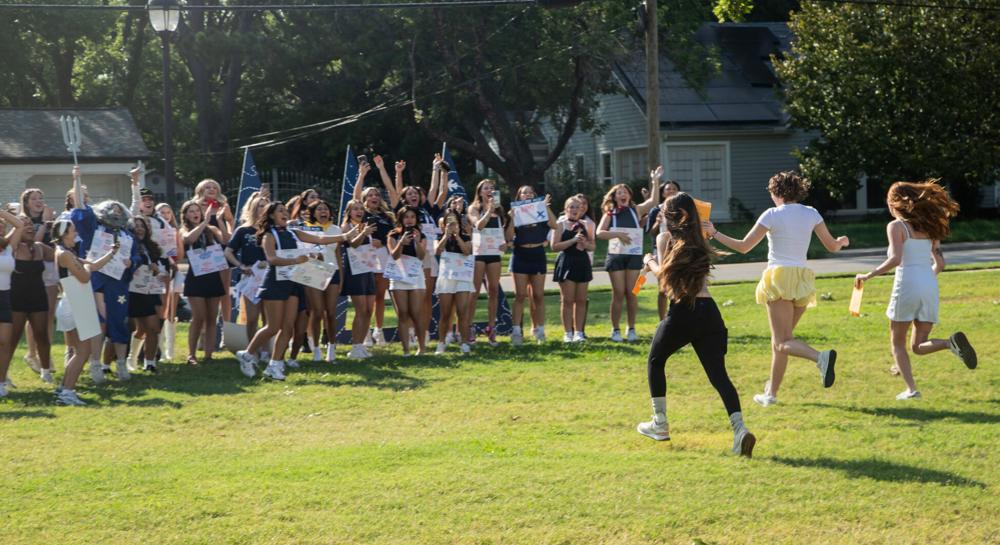
- Ribbon-cutting ceremony officially opens Maverick HallFaculty, staff and city officials gathered Monday for the ribbon-cutting at Maverick Hall. Attendees flooded the common area in the $116 million, 205,638-square-foot residence hall, where they listened to speeches, mingled and toured the facilities. The hall stands at five stories and can house 654 students across its four wings. The space features eight study spaces, laundry rooms and kitchens on every floor, access to a relaxation room and three different rooming options: private, single and double. UTA President Jennifer Cowley was one of several speakers at the ribbon-cutting. During her speech, she said that the project had been part of the university's dream for a long time, noting that the project took a lot of effort and that she’s proud to see it open officially. “When we were creating Maverick Hall, we wanted it to reflect who we are as a community,” Cowley said. “That we’re about collaboration, innovation and community, and that that is the heart of the UTA experience.” UT System Chancellor John Zerwas was also in attendance and gave remarks on the new hall. “These are exceptionally created environments for people to learn and thrive in,” Zerwas said. Student Body President Effua Jordan said the space represents the growth and opportunity of the UTA community through the number of people it allows to live on campus. “I think specifically here at UTA, it represents a step in the right direction for us to change the commuter narrative that we used to have,” Jordan said. Kyle Boone, Housing and residence life executive director, said upon touring the hall that he never thought he’d see a hall with full-size beds, saying innovation and creativity came out in the design and that the university listened to students when crafting the building. “This new building was really the vision of a group of good leadership,” Boone said. “It shows the promise of ‘We want more students who live on campus.’” @tay._.sansom news-editor.shorthorn@uta.edu
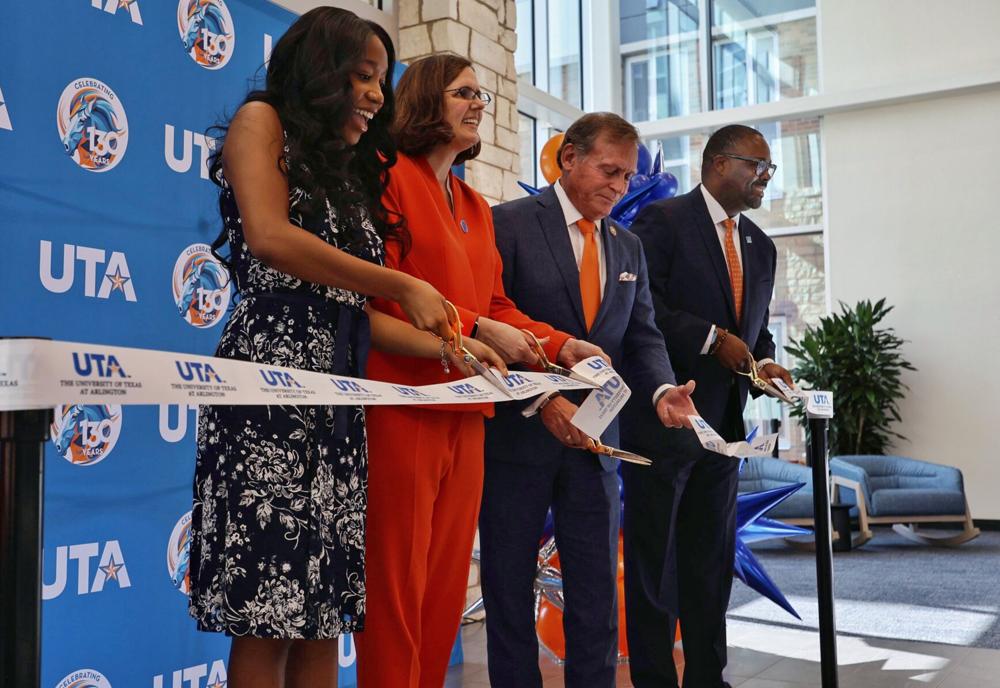
Load more...
Loading...


